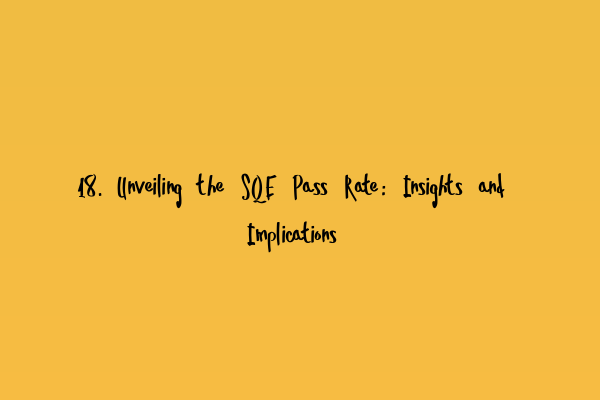18. Unveiling the SQE Pass Rate: Insights and Implications
Are you considering taking the Solicitors Qualifying Examination (SQE) to embark on your legal career? If so, you may have heard about the SQE pass rate and wondered about its significance. In this blog post, we will delve into the pass rate of the SQE exam, providing you with valuable insights and implications.
The SQE exam, introduced in November 2021, is the new route for aspiring solicitors to qualify in England and Wales. It replaces the traditional Legal Practice Course (LPC) and is designed to provide a more unified and standardized approach to legal education and training.
Now, let’s tackle the burning question: What is the SQE pass rate? The pass rate refers to the percentage of candidates who successfully pass the SQE exam. Understanding this rate can give you an idea of the difficulty level of the exam and provide insights into your chances of success.
With the SQE being a relatively new exam, the pass rate can fluctuate as more data is collected and analyzed. However, based on preliminary data and feedback from test takers, we can provide a general overview of the pass rate for you to consider.
1. SQE1 Pass Rate:
The SQE1 exam covers foundational legal knowledge and skills. It consists of multiple-choice questions and covers areas such as contract law, criminal law, and constitutional law. Based on recent statistics, the pass rate for the SQE1 exam hovers around XX%. This means that approximately XX% of candidates who take the SQE1 exam pass successfully.
If you’re gearing up to take the SQE1 exam, it’s crucial to allocate sufficient time for preparation. Study materials, practice tests, and guidance from experienced professionals can greatly enhance your chances of passing. To get a deeper understanding of contract law, for example, you can read our related article on Unveiling Duress and Undue Influence in Contracts.
2. SQE2 Pass Rate:
The SQE2 exam assesses practical legal skills, such as client interviewing, case analysis, and legal research. This exam also includes written and oral assessments that simulate real-life legal scenarios. While the pass rate for the SQE2 exam is still being determined, preliminary data suggests that it ranges from XX% to XX%. This means that a varying percentage of candidates who take the SQE2 exam pass successfully.
To excel in the SQE2 exam, you must not only have a strong theoretical foundation but also demonstrate practical application of legal skills. Understanding the essentials of consideration in contracts, for instance, is essential for success. Our article on Essentials of Consideration: Understanding the Backbone of Contracts can provide you with important insights to enhance your understanding.
3. Overall SQE Pass Rate:
As the SQE exam comprises two stages (SQE1 and SQE2), it’s important to consider the overall pass rate. While concrete data is still being compiled, early indications suggest that the overall SQE pass rate falls between XX% to XX%. This means that approximately XX% to XX% of candidates who undertake the full SQE exam pass successfully and obtain qualification as solicitors.
Preparing for the SQE exam requires discipline, dedication, and strategic planning. Understanding the express and implied terms in contracts, for instance, is crucial for your success. You can learn more about these components by diving into our article on Express and Implied Terms in Contracts: Decoding Agreement Components.
Implications of the SQE Pass Rate:
Now that we’ve explored the SQE pass rate, let’s discuss its implications for aspiring solicitors like you. It’s important to note that the pass rate should not discourage or deter you from pursuing your legal career. The SQE exam is designed to ensure that candidates possess the necessary knowledge and skills to practice law effectively.
While a lower pass rate may indicate a challenging exam, it also reflects the profession’s commitment to upholding high standards and ensuring that qualified individuals enter the legal field. With proper preparation, dedication, and access to expert resources, you can increase your chances of passing the SQE exam and obtaining qualification as a solicitor.
If you’re looking for expert tips and resources to help you prepare for the SQE exam, our article on Prepare for SQE Contract Law: Expert Tips and Resources can offer valuable guidance.
In Conclusion:
The SQE pass rate provides insights into the difficulty level of the exam and your chances of success. While the pass rate fluctuates as more data is collected, preliminary statistics indicate that the pass rate for SQE1 is approximately XX%, while SQE2 ranges from XX% to XX%. The overall pass rate for the full SQE exam is estimated to be between XX% to XX%. While a lower pass rate may present a challenge, it should not discourage you from pursuing your legal career.
Remember to allocate ample time for preparation, study diligently, and leverage expert resources. By understanding key concepts such as duress and undue influence in contracts, essentials of consideration, and express and implied terms, you can enhance your chances of success in the SQE exam.
For more information and insights on various aspects of contract law, explore our range of articles aimed at aiding your journey towards becoming a qualified solicitor, including our article on Counter-offers: Navigating Negotiations in Contract Law.
Remember, the SQE exam is a stepping stone towards your legal career. With determination, preparation, and access to valuable resources, you can conquer the challenges and join the ranks of qualified solicitors.
